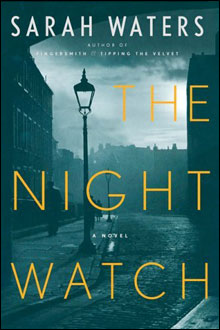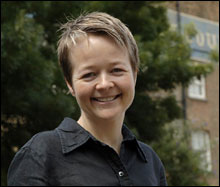 Even those painfully aware of history may be condemned to repeat it, or at least not escape it. Such is the message of Sarah Waters’s new novel The Night Watch. Set in London during and immediately after World War II, it’s a study of interlocked characters who survive the Blitz to find themselves stranded by the peace.
Even those painfully aware of history may be condemned to repeat it, or at least not escape it. Such is the message of Sarah Waters’s new novel The Night Watch. Set in London during and immediately after World War II, it’s a study of interlocked characters who survive the Blitz to find themselves stranded by the peace.
“So this, said Kay to herself, is the sort of person you’ve become: a person whose clocks and wrist-watches have stopped, and who tells the time, instead, by the particular kind of cripple arriving at her landlord’s door.” Kay is a particular kind of cripple herself, the former “night watch” ambulance driver of the title. Physically uninjured, she’s emotionally wasted, unable to move on after a betrayal that was a kind of death.
Her story forms the core of the book, along with the lives of a “fey-looking boy,” Duncan, who was recently released from prison, Viv, who’s caught in the inertia of a failed affair, and Helen, whose nervous jealousy is driving her lover away. Working backward, beginning in 1947 and ending with a first meeting six years earlier, the novel winds these characters up in each other’s lives. Duncan visits Kay’s faith-healer landlord. Viv, who shares an office with Helen, spots Kay in a crowd. The imagery of Kay’s opening words recurs frequently as well, in the injuries of the walking wounded and in both metaphorical and literal circles, as with the return of a worn gold ring. It’s a clever construction, but one with heart. These are full, well-drawn characters, and Waters particularly excels at depicting the crushing weight of depression. Thinks Kay: “Her day was a blank, like all of her days. She might have been inventing the ground she walked on, laboriously, with every step.” Helen notes about Viv, “there was something — something disappointed about her. . . . A sort of greyness. A layer of grief, fine as ash, just beneath the surface.”
What has trapped them, like flies in amber, is the emotional aftermath of trauma. First, there’s the recent war, as characters stumble through a poor, gray London, itself limping by on shortages. Then there are each character’s more intimate wounds, for which the larger crisis serves as a backdrop and physical manifestation.
 Beyond this updating of Ruskin’s pathetic fallacy, however, Waters has chosen an interesting and relevant time in history. Her best-known previous books, 1999’s Tipping the Velvet and 2002’s Fingersmith (the latter shortlisted for both the Booker and the Orange prizes), were lighthearted takes on the Victorian era, lesbian romps that played with the period’s sexual hypocrisy. Affinity (1999), set in the same period, was more serious in tone but also less engaging. Moving ahead 60-plus years, Waters combines the narrative polish of Fingersmith with the weight she attempted in Affinity. And, finally moving beyond Victoria, she has managed to find a more repressive era: England in 1947 wanted to put the war behind it, and that included a step back in gender roles. This clampdown may have had its roots in the miserable post-war economy, where women who had been encouraged to take jobs were shunted aside in favor of veterans. But it was also social, a reactionary backlash against the heightened emotional intensity and devil-may-care mores of wartime, comparable to the Father Knows Best ’50s in the more prosperous United States.
Beyond this updating of Ruskin’s pathetic fallacy, however, Waters has chosen an interesting and relevant time in history. Her best-known previous books, 1999’s Tipping the Velvet and 2002’s Fingersmith (the latter shortlisted for both the Booker and the Orange prizes), were lighthearted takes on the Victorian era, lesbian romps that played with the period’s sexual hypocrisy. Affinity (1999), set in the same period, was more serious in tone but also less engaging. Moving ahead 60-plus years, Waters combines the narrative polish of Fingersmith with the weight she attempted in Affinity. And, finally moving beyond Victoria, she has managed to find a more repressive era: England in 1947 wanted to put the war behind it, and that included a step back in gender roles. This clampdown may have had its roots in the miserable post-war economy, where women who had been encouraged to take jobs were shunted aside in favor of veterans. But it was also social, a reactionary backlash against the heightened emotional intensity and devil-may-care mores of wartime, comparable to the Father Knows Best ’50s in the more prosperous United States.
ADVERTISEMENT
 |
For Waters’s primary characters — lesbians and homosexuals at various stages of being out, and a straight adulterer — this means a rationing of affection and acceptance along with other necessities. Trapped by the past in a society desperate to forget it, they are doomed. But we knew that from the start.
Sarah Waters | April 7, 12:30 pm | Borders, 10-24 Washington St, Boston | 617.557.7188 | Simmons College, 300 the Fenway, Room C103 | April 7, 7 pm | 617.876.5310